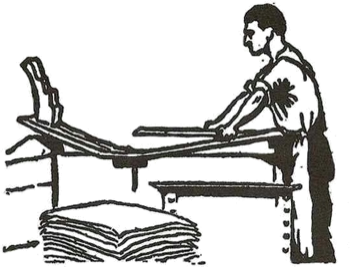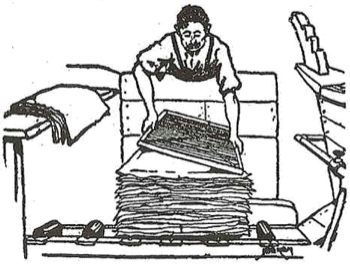Each manual craft leaves its own marks, by which one skilled may tell a worker's business, and the paper maker's hands are deeply corned and calloused along the palms and joints. They are his stock in trade and he takes the utmost care of them, for a bleeding corn, or cut, or any wound instantly disables him and he cannot tend the vat until they are sound again.
At this moment Robert Life was out of action, with asore on his thumb, and employed for the time at other labour; but he joined the men in the dinner hour and shared a discussion concerning the supreme disaster which may to the vatman's lot.
"Did you ever lose your stroke? " asked Life of Mr. Knox. "I've heard of men that did and never got it back no more."
"May it never happen to you, Robert," answered the elder, "for anything more dreadful and shattering you can't imagine. Yes, I lost my stroke eight years ago ; and I can remember every item of the tragedy as if it was yesterday."
"Along of illness? " asked Life, "or your own fault? "
"As I'm among friends," replied Philander, " I'll con- fess that it was my own fault. I tell you these things as a warning to you younger men. It was whiskey. I'd go on the burst sometimes, though never what you'd call a drinker. But I held an opinion it was better to have a fair wallow in it now and again with teetotal intervals, than to be always drinking, you see; and once I overdid it and lost my stroke. I came to the vat and dipped, but the touch was gone. I tried and failed and washed off again and again; but I couldn't make paper.
Reference: The Story of Handmade Paper (1924)

Vatman
They came round me and said hopeful things, and I stood like a stuck pig among 'em and the sweat poured down my face. Then I dropped the mould and sneaked away and felt as if the end of the world had come. For I knew bitter well that often and often the stroke once lost is never got back."
"You got yours back, however? "
"In my terror I signed the pledge and promised the Almighty a lot of very fine things if He'd be merciful and let me regain my skill. My self-respect was gone and I'd have grovelled to God, or anybody who could help me. My foreman was a very good chap and understood the nature of the disaster. He cheered me and felt so positive sure I should get it back, that I began to think I should myself. For in such case half the battle is to have cheerful, hopeful people about you, who'll make light of the tragedy and say it's going to be all right. The moral effect of that helps you to hope against hope and recover your nerve, when you come to try again. It's all nerve really, and if you can get back your nerve, then you'll probably get back your stroke."
"At the third trial I got mine back anyway, and 'twas a very fine example of the best in human nature to see how my coucher and layer shook hands with me when I made my first sheet and how glad my fellow vatmen were about it."
"And did you keep all your good promises ?" asked Kellock.
"For practical purposes, yes," answered Philander. "I improved a good bit after that adventure and never went on the burst again. The pledge, however, I did not keep, because by experiment I found I could work better on beer than water; but spirits are a thing of the past. I don't drink more than a whiskey or two a week now-a- days."
Reference: The Story of Handmade Paper (1924)

Coucher